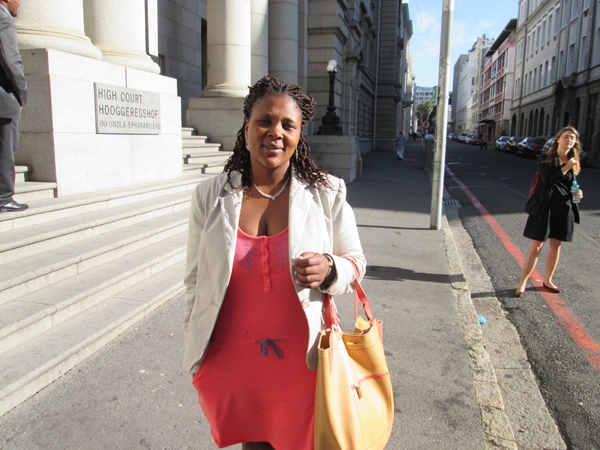Angy Peter: state probe was biased, says defence

The police investigation into the murder of Rowan du Preez was biased, the defence advocate in the Angy Peter trial has argued.
Peter, her husband Isaac Mbadu and co-accused Azola Dayimani and Christopher Dina are on trial in the Western Cape High Court for the assault, kidnapping and necklacing of Du Preez in Bardale in early hours of 13 October 2012.
The trial was delayed for more than four hours on Monday by the disruption of public transport systems in Nyanga, Philippi East and the N2 on Monday, and then postponed.
Presenting closing arguments on Tuesday, advocate William King said the police investigation into Du Preez’s murder had not been fair and impartial, and the state case had been “stitched up” to implicate Social Justice Coalition activist Peter and Mbadu.
He said police wanted to implicate members of the SJC because the movement had called for the Commission of Inquiry to probe policing in Khayelitsha. He referred to police statements to the media claiming that all four accused were members of SJC.
King said Peter had been seen on television news collecting evidence about police incompetence in Khayelitsha.
Earlier, state prosecutor Fistus Pelesa said Peter had failed to prove her allegation that police had concocted evidence to implicate her in a crime. Pelesa said Peter had not singled out any individual from the police who could have been behind this and had sometimes referred to Mfuleni police and sometimes to the provincial police leadership.
Referring to the “Guptagate” incident, in which an aircraft carrying guests to a private wedding in the Gupta family was allowed to land at Waterkloof military air base, King said it was known that the Guptas were friends of the state president but nobody had admitted to taking part in authorising the landing. He said in the Peter case the police had acted in the interests of the provincial commissioner, Lieutenant General Arno Lamoer.
King said state witnesses had motives to testify against Peter and Mbadu and witnesses to the same event had come up with different stories. He said friends and family members of the deceased wanted revenge and they had fabricated evidence to suit the police version.
Investigative officer Stanford Muthian King was not only incompetent but also good at dodging questions, King said.
He argued that the state could not dispute the alibi of Peter and her co-accused because it had not been investigated.
Pelesa said the alibi should be rejected because certain elements of it were disputable and there was no evidence to support Peter’s version that she was at home with her children at the time of the murder.
Judge Robert Henney questioned the state on its failure to investigate the alibi. He said it was important to probe its legitimacy.
The state completed its closing arguments, with the prosecutor calling for the court to find all the accused guilty for the murder of Rowan du Preez.
Pelesa said Peter had a motive to murder du Preez after he had stolen their television. He referred to the evidence of Asavela Zici, who testified about hearing the accused saying whoever had stolen her TV must be burned, and to that of Desree Jack who had told the court that Peter had confronted Du Preez at his home and made threats.
The defence arguments continue.
Support independent journalism
Donate using Payfast

Don't miss out on the latest news
We respect your privacy, and promise we won't spam you.

This article is licensed under a Creative Commons Attribution-NoDerivatives 4.0 International License.
